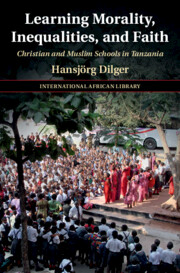Book contents
- Learning Morality, Inequalities, and Faith
- The International African Library
- Learning Morality, Inequalities, and Faith
- Copyright page
- Contents
- Figures
- Acknowledgements
- Note on Language Use
- 1 Introduction
- Part I (Post)Colonial Politics of Religious Difference and Education
- Part II Moral Becoming and Educational Inequalities in Dar es Salaam
- 4 Market Orientation and Belonging in Neo-Pentecostal Schools
- 5 Marginality and Religious Difference in Islamic Seminaries
- 6 Privilege and Prayer in Catholic Schools
- 7 Conclusion
- References
- Index
- Titles in the Series
7 - Conclusion
Politics, Inequalities, and Power in Religiously Diverse Fields
from Part II - Moral Becoming and Educational Inequalities in Dar es Salaam
Published online by Cambridge University Press: 16 December 2021
- Learning Morality, Inequalities, and Faith
- The International African Library
- Learning Morality, Inequalities, and Faith
- Copyright page
- Contents
- Figures
- Acknowledgements
- Note on Language Use
- 1 Introduction
- Part I (Post)Colonial Politics of Religious Difference and Education
- Part II Moral Becoming and Educational Inequalities in Dar es Salaam
- 4 Market Orientation and Belonging in Neo-Pentecostal Schools
- 5 Marginality and Religious Difference in Islamic Seminaries
- 6 Privilege and Prayer in Catholic Schools
- 7 Conclusion
- References
- Index
- Titles in the Series
Summary
Chapter 7 presents the diverse educational engagements of Christian and Muslim actors in Dar es Salaam in a comparative perspective, highlighting the convergences and divergences in the quest for a good life across these two religious educational fields. I argue that anthropological research is particularly well suited to producing new empirical insights into the coexistence of Christian and Muslim actors and lives – and their entangled struggles for moral becoming – in global Africa. The ethnographic research of this book makes it clear that faith-oriented schools have become – in highly varied ways – a public force in the wake of urbanisation and its unequal articulations in contemporary Tanzania. I argue that comparative studies of religiously diverse urban landscapes in Africa need to adopt a stronger focus on processes of institutionalisation, as well as on configurations of inequality and power, in order to understand the close entanglement of moral becoming, social stratification, and religious differences in the highly volatile contexts of the globalising market economy.
Keywords
- Type
- Chapter
- Information
- Learning Morality, Inequalities, and FaithChristian and Muslim Schools in Tanzania, pp. 218 - 235Publisher: Cambridge University PressPrint publication year: 2021

